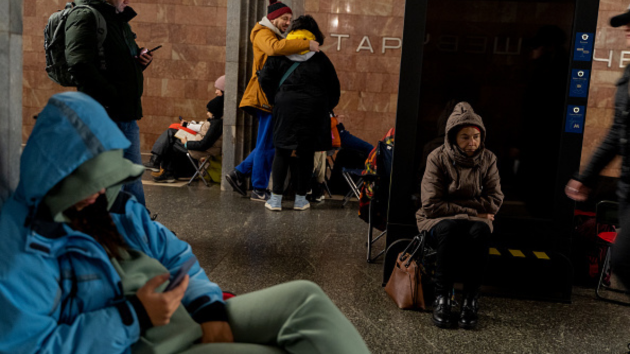Gazans mark holy month amid struggles: ‘This Ramadan is not happy’
Written by ABC Audio ALL RIGHTS RESERVED on March 12, 2024
(GAZA and LONDON) — The holy month of Ramadan is being marked across the Muslim world, but for people in Gaza, it’s a far more somber and muted time than in previous years, as the Israel-Hamas war approaches the six-month mark.
Much of the enclave’s population of 2.2 million people is now homeless, the United Nations has said, with many living in makeshift refugee camps. Food, water, medical supplies and other resources are scarce.
Many Gazans have been involuntarily fasting long before the holy month, which started on Monday, as they simply cannot find food. Part of the religious observance of Ramadan involves fasting from dawn to sunset.
“I see people walking in search of food, but their eyes are empty and their souls are dead,” Loujain Anan, a 25-year-old from Gaza City, told ABC News. Anan is one of the 1 million displaced people who have taken shelter in Rafah, the small town in southern Gaza that borders Egypt.
“A day is a struggle between me and memories. Our days have become about survival, not life. Remember that Gaza is not fine and this Ramadan is not happy,” Anan said.
Enough food ‘to feed entire population’ sitting outside Gaza as malnutrition death toll reaches at least 20: WFP
Anan said she’s haunted by her memories of previous Ramadans, telling ABC News: “A scene appears before me, of me, my family and friends, sitting in front of the television with a long meal of delicious and varied food in front of us.”
That’s in stark contrast to what she faces now, she said. “I feel my heart beating hard and very cold air hitting my bones, and I wake up on a cold mattress on an empty floor in a room that is not my room and a house that is not my home,” Anan said. “I see my mother and her friend placing a few lanterns on the table and decorations on the wall. I look at her but I feel nothing but the pain of memories.”
Anan is not the only Gazan struggling to embrace Ramadan this year.
“I cannot believe that we are living during the month of Ramadan under war and bombing,” Nabila Rabie, 62, told ABC News.
Rabie has been displaced from her home in Khan Younis and is now living in a tent in Al Mawasi in southern Gaza.
“I am tired of sleeping in the tent, life here is very difficult and impossible. I feel that my heart will stop due to the intensity of sadness over this tragic situation,” she said.
President Joe Biden had warned of a “very dangerous” situation if a cease-fire wasn’t reached by the start of Ramadan. An Israeli political official with knowledge of the negotiations recently told ABC News that progress toward reaching another cease-fire and hostage deal is slow.
Israel-Hamas truce talks stall as war in Gaza grinds on
Historically, Ramadan is a tense month in Israel, with Palestinians and Israeli police regularly clashing over access to the Al-Aqsa Mosque in Jerusalem, one of the holiest sites in Islam, which is in the same compound as Temple Mount — one of the holiest sites in Judaism.
Abu Ubaida, spokesperson for the military wing of the Hamas terrorist organization, called Ramadan “the month of victory, the month of jihad,” and in a video statement released Friday on Telegram, called for “our people to march on Jerusalem … to pray in the mosque … and to stop the occupation achieving its aims of controlling and dividing. Al-Aqsa Mosque belongs to us.”
The comments have alarmed Israeli authorities, who are granting access to the Al-Aqsa Mosque on a limited basis, allowing only Palestinian men over 55, women over 50 and children under 10 who have the correct travel permits to visit, according to the Israeli Prime Minister’s Office. The office said it would allow a similar number of worshipers into the mosque this year as it did in 2023, when it was estimated between 200,000 and 250,000 people worshiped there every Friday during Ramadan.
Further restrictions could reportedly be introduced for Friday prayers.
The tension is particularly heightened this year as Israel continues its aerial bombardment and ground operations in Gaza, following Hamas’ attack. Palestinian Islamist militants carried out an unprecedented incursion from Gaza into southern Israel by air, land and sea on Oct. 7, 2023, killing more than 1,200 people and taking 253 others hostage, according to Israeli authorities.
The Israeli government, under Prime Minister Benjamin Netanyahu, has said it’s determined to destroy Hamas and plans to invade Rafah, where it says Hamas leaders are hiding and where Israeli officials believe some of the hostages are being kept in tunnels.
More than 31,000 Palestinians have been killed and more than 72,000 others have been injured in Gaza since Oct. 7, according to the Hamas-run Gaza Health Ministry.
Hundreds of truckloads of aid for Gaza stuck as more lives lost to malnutrition, some aid organizations say
For many in Gaza, the holy month of Ramadan is an unwelcome reminder of what they have lost.
“Now we miss everything. Our hearts are sad because this is a great loss. We lost our entire life and we are waiting to be relieved from this pain before our hearts explode from this tragedy,” 42-year-old Suhail Al-Akhras, who was displaced from Gaza City and has been living in Rafah’s tent city, told ABC News.
“I will miss everything during the month of Ramadan. I will miss sitting with my family. I will miss the iftar [breaking of the daily fast] table on which we put all the various types of food,” he said. His children will not be fasting this year, he explained, as there isn’t enough nutritious food for their evening iftar meal to properly replenish them.
Those in Gaza who feel weak due to undernourishment may forgo fasting, and those for whom fasting would pose a serious health risk must forgo fasting, Abbas Shouman, secretary-general of Al-Azhar’s Council of Senior Scholars in Cairo, said, The Associated Press reported.
More than 500,000 people in Gaza face ‘catastrophic hunger’: UNRWA
Hunger in Gaza is at a “catastrophic level” and more than 90% of the population faces acute food insecurity, the U.N. Relief and Works Agency for Palestine Refugees in the Near East (UNRWA) said Tuesday.
Thousands in northern Gaza are malnourished and at risk of starvation, according to the U.N., and so would be unable to fast.
The World Food Programme, an arm of the U.N. that has been trying to get much-needed aid to the area, has called the situation “a humanitarian catastrophe.” More than half the population in Gaza faces “catastrophic hunger,” multiple U.N. organizations warned in January.
“Recently, children from Gaza City and its north came to our hospital suffering from malnutrition and severe dehydration,” Dr. Ahmed Al-Kahlot, head of the care and nursery department at Kamal Adwan Hospital in northern Gaza, told ABC News.
“Some of them died,” he added.
ABC News filmed inside the Kamal Adwan Hospital and captured distressing images of a 12-year-old boy who was severely malnourished and dehydrated. Muhammad Rajab was brought to the hospital two weeks ago and is still in critical condition, hospital staff said, telling ABC News they don’t have the right resources to treat him.
The neonatal unit at the hospital is operating far beyond capacity, with many newborns fighting for life, Al-Kahlot said. “Most of the cases you see are at risk of death at any moment,” Al-Kahlot added.
One mother who spoke to ABC News said her newborn was dehydrated. “Malnutrition negatively affects breastfeeding,” she said. “The baby does not get enough from breastfeeding so he became dehydrated.”
Her baby now has kidney issues, she said, and she’s very concerned. “What has this 1-month-old baby done to deserve this?” she said.
Overcrowded hospitals, few supplies causing ‘complete collapse’ of Gaza health system
While the situation doesn’t currently appear as extreme in Rafah as it is in northern Gaza, there’s little enthusiasm for the reflection and communality that traditionally comes with Ramadan.
“There is no joy, there is no food for breakfast and suhoor [the meal consumed early in the morning before fasting], there are no family gatherings, all my children were displaced in different areas in the Al-Mawasi area in tents,” Rabie told ABC News.
“We have had enough of destruction, death and hunger,” she added.
There are some people, however, who are trying to bring some Ramadan joy to the people of Rafah. Tents in the displacement camps have been decorated with lights, people are still trying to gather for evening prayer and iftar — the evening meal that breaks the fast.
To mark the start of Ramadan, Hala Abu Al-Lail, a young graduate of public relations and advertising, said she organized some games for the children in the camps.
“I loved to get them out of the atmosphere of war, support them psychologically, and provide entertainment,” she said, adding: “I am so happy because I saw them happy. They have not been happy for a long time, they are even sad about the joy.”
Copyright © 2024, ABC Audio. All rights reserved.







